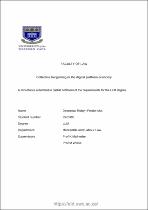| dc.contributor.advisor | Malherbe, Kitty | |
| dc.contributor.author | Fredericks, Davronae Robyn | |
| dc.date.accessioned | 2023-08-22T09:59:41Z | |
| dc.date.available | 2023-08-22T09:59:41Z | |
| dc.date.issued | 2022 | |
| dc.identifier.uri | http://hdl.handle.net/11394/10496 | |
| dc.description | Magister Legum - LLM | en_US |
| dc.description.abstract | Collective bargaining is a process in which collective negotiation takes place between an employer and groups of employees who are represented by trade unions with conflicting interests seeking to reach an agreement.1 Collective bargaining is ‘collective’ in the sense that it cannot take place on an individual basis between an employer and an individual employee but rather between an employer and groups of employees that are represented by trade unions or trade union federations.2 The collective nature of collective bargaining is only necessary on the side of employees and a single employer can be a party to the bargaining process.3 | en_US |
| dc.language.iso | en | en_US |
| dc.publisher | University of the Western Cape | en_US |
| dc.subject | Labour law | en_US |
| dc.subject | Constitution of the Republic of South Africa, 1996 | en_US |
| dc.subject | Covid-19 | en_US |
| dc.subject | Public health | en_US |
| dc.subject | Labour Relations Act 66 of 1995 (LRA) | en_US |
| dc.title | Collective bargaining in the digital platform economy | en_US |
| dc.rights.holder | University of the Western Cape | en_US |

